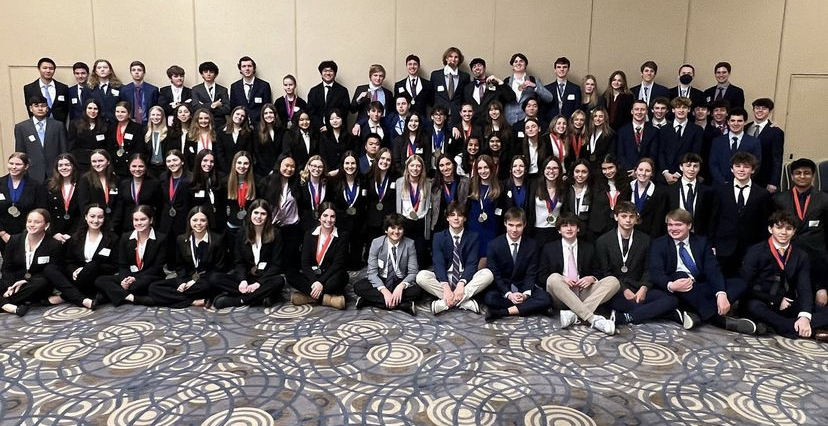Strictly business for New Trier club
DECA finishes season with an impressive state competition
DECA instagram
New Trier DECA competes in/brings home medals at North Suburban Area Conference on March 5 in Chicago
On Mar. 5 at the Hyatt Regency in O‘Hare, Chicago, New Trier DECA students took to the stage and left with an impressive collection of medals from the state competition. 21 of the 43 New Trier students who competed placed in the top ten, with four of them placing top four.
Graham Roche and Lucas Flick placed 4th in Sports and Entertainment, Kendall Humphries-Solis placed 2nd in Principles of Finance, and Bobby O’Keefe placed 4th in Business Finance Series. They will compete at internationals in Orlando in late April.
In order to qualify for state, 92 students participated in the North Suburban Area Competition. The students who placed in the top three in their division qualified for state.
“We can only take 40 to 45 students to state every year,” says Bob Bollweg, a business teacher and sponsor of the club. “So we use our north suburban area competition to see who qualifies for state.”
Each DECA event consists of a two-part case study in topics such as finance, business management, and entrepreneurship.
Competitors complete a 100 question multiple choice test on their topic. Then, they receive a case study and half an hour to prepare for a ten minute pitch that will be presented to a panel of judges who are usually professionals in the subject matter.
“Judges might assume the role of an angry customer, or a hotel manager, and the student is the one giving the recommendations,” Bollweg explains.
Senior Ana Ryerson placed second at last year’s state competition in the Hospitality and Tourism event and competed at internationals in Atlanta the year before. This year she placed 10th.
“I think the test is the hardest part,” she says. “There’s only so much you can do to prepare for the case studies because you don’t know what’s going to be given to you. You just have to be creative and think on the spot.”
Ryerson also notes that members don’t need to want to pursue business in the future to join or have success in DECA.
“I’m going into computer science, and business was just kind of something I wanted to explore at the beginning.”
Another standout was Junior Ali Beanblossom, who was one of six elected state officers for Illinois DECA, and served as Vice President of Philanthropy.
“As a state officer, I worked with 5 other Illinois officers to create initiatives and engagement with DECA chapters across the state,” says Beanblossom.
She played a key role in planning the state competition, which was attended by roughly 1,500 high school competitors from dozens of schools. Her responsibilities included tackling fundraising and other charity efforts for DECA teams.
“I encouraged Illinois high school DECA chapters (teams) to complete civic consciousness projects, which ranged from Feed My Starving Children trips, to Dodgeball tournament fundraisers, to auctions,” explains Beanblossom.
In all, Illinois DECA raised nearly $85,000 for various charities.
Beanblossom also helped organize a state-wide raffle for the Muscular Dystrophy Association, a longtime DECA partner.
Keeping track of philanthropic work from a number of chapters was challenging for Beanblossom. Despite this, Beanblossom expresses that it paid off.
“My favorite part about the position was getting to know these High School DECA chapters across the state and seeing how much of an impact they made on their communities,” she says.
DECA meets every Thursday during the school year, and often hosts guest speakers from the business and entrepreneurship community. Recent guests include founder of GrubHub, Mike Evans, and Colin McBride, Vice President of a Chicago based private equity firm. Leading up to state, students used meetings to conference with the leadership team or practice role plays. Newer DECA members were able to participate in a mini-competition in Highland Park.
In the end, however, DECA has applications beyond crisp suits and shiny medals.
“It prepares students for interviews,” emphasizes Bollweg. “It prepares them for networking. It prepares them for problem solving, and it gets them a sense of what they might be doing in a job six or seven years down the road.”







































